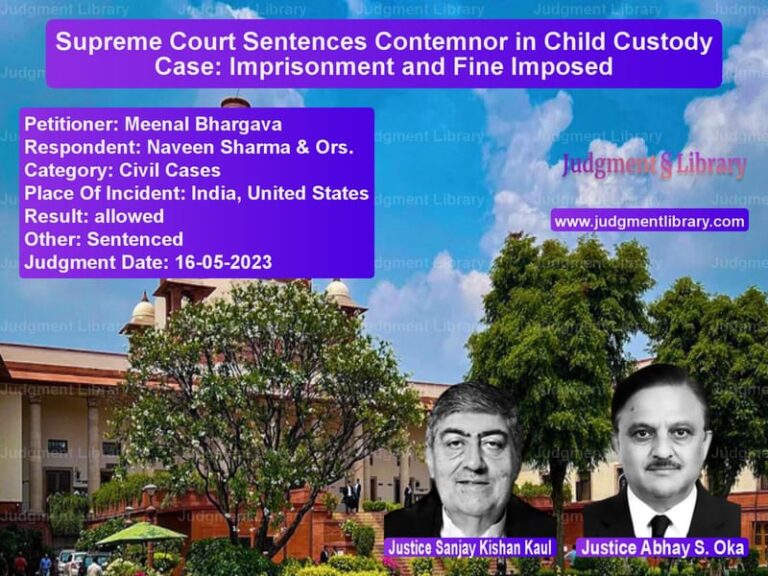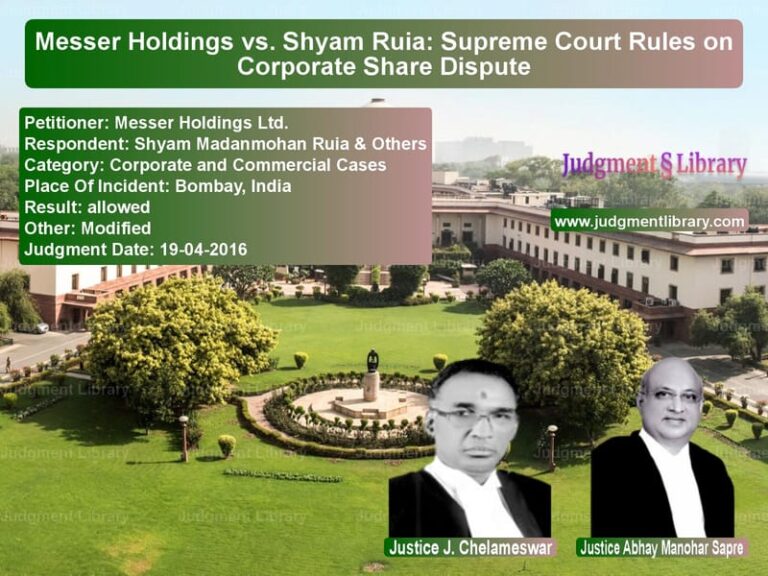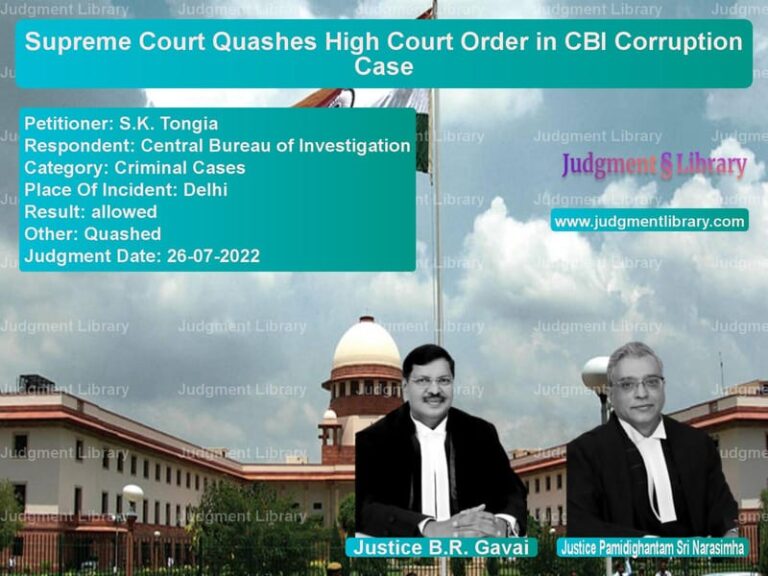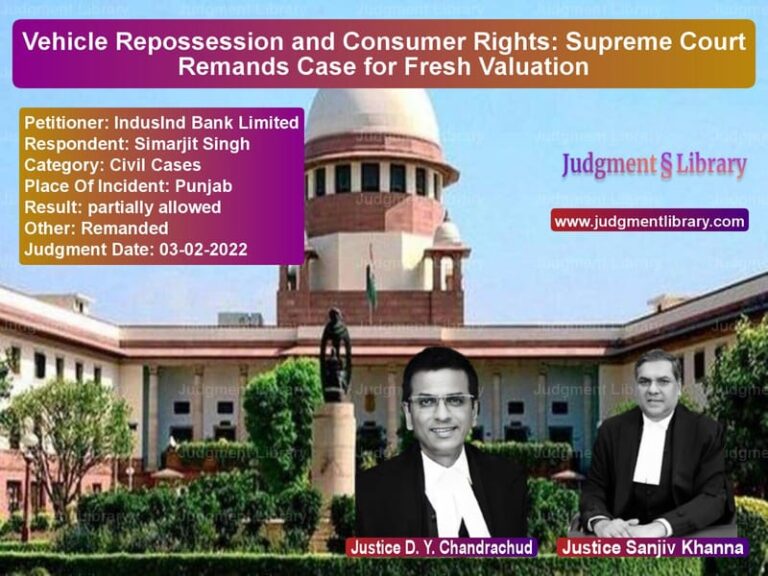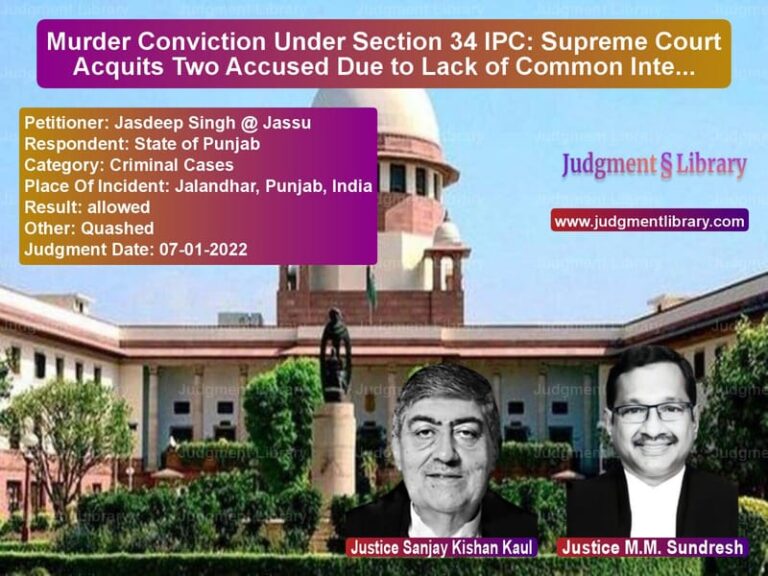Supreme Court Grants Divorce on Irretrievable Breakdown of Marriage: Key Insights on Alimony and Litigation Quashing
The Supreme Court of India, in the case of Rinku Baheti vs. Sandesh Sharda, delivered a pivotal judgment on December 19, 2024, addressing the complexities of marital dissolution under Article 142(1) of the Constitution. The Court, after considering the irretrievable breakdown of marriage between the parties, decided to exercise its extraordinary powers under Article 142(1) to grant a decree of divorce, quash criminal proceedings, and determine the quantum of permanent alimony.
Background of the Case
The petitioner-wife, Rinku Baheti, and respondent-husband, Sandesh Sharda, were married on July 31, 2021, following Hindu rites. The marriage, however, faced immediate difficulties, primarily due to the respondent’s continued involvement with his ex-wife, children, and aging father. The couple, who had previously agreed to divorce by mutual consent, faced multiple rounds of litigation involving divorce petitions, criminal complaints, and allegations of cruelty from both sides.
The respondent, a US-based IT consultant, filed three divorce petitions between 2022 and 2023, citing cruelty as grounds for divorce. The petitioner-wife responded with multiple criminal complaints, including allegations of mental cruelty, sexual harassment, and defamation. The Court was asked to intervene in the matter and grant relief based on the irretrievable breakdown of the marriage, with both parties citing the inability to continue the marital relationship.
Legal Issues Raised
- Whether the Court can grant divorce on the ground of irretrievable breakdown of marriage under Article 142(1) of the Constitution, even when one spouse opposes the petition.
- Whether criminal proceedings initiated by the petitioner against the respondent and his family can be quashed as part of the marital dispute resolution.
- What is the reasonable quantum of permanent alimony for the petitioner, considering the respondent’s financial status and the brief duration of the marriage.
Arguments Presented
Arguments by the Respondent (Husband)
- The respondent argued that the marriage had irretrievably broken down, citing the petitioner’s unreasonable demands, criminal complaints, and threats to implicate him and his family in false cases.
- He submitted that despite his efforts to resolve the differences, the petitioner continued to raise allegations against him and his family, thereby rendering any reconciliation impossible.
- The respondent also sought a decree of divorce under Article 142(1) of the Constitution of India, claiming that this would allow for complete justice in the case.
- Furthermore, the respondent argued that the petitioner’s financial demands were excessive, citing her own income, assets, and education.
Arguments by the Petitioner (Wife)
- The petitioner opposed the divorce, stating that she still wished to continue the marital relationship despite the issues faced, and had not yet exhausted all possibilities of reconciliation.
- She argued that the respondent was misusing the powers under Article 142(1) to seek divorce without just cause and that the marriage had not completely broken down as alleged.
- The petitioner also sought permanent alimony in the amount equivalent to what the respondent had provided to his first wife, citing the respondent’s financial capacity.
- She further demanded that the matrimonial home in Pune be considered part of her entitlement to alimony, as it had been her residence during the marriage.
Supreme Court’s Observations
On the Use of Article 142(1) for Divorce
The Supreme Court referred to its previous decisions and the legal principles laid out in Shilpa Sailesh v. Varun Sreenivasan, where it was held that the power under Article 142(1) could be used to grant divorce on the grounds of irretrievable breakdown of marriage, even if one spouse opposes the petition. The Court emphasized that:
“This Court can grant divorce in exercise of its power under Article 142(1) of the Constitution when the marriage is beyond repair, and the continuation of the marriage would only result in more harm and injustice to both parties.”
On the Irretrievable Breakdown of Marriage
The Court acknowledged the significant deterioration in the marital relationship, pointing out the continuous litigation, the respondent’s prolonged separation, and the mutual allegations of cruelty. The Court held:
“The irretrievable breakdown of marriage is a ground recognized by this Court in cases of extreme marital discord. In this case, the persistent legal battles, criminal complaints, and the refusal of both parties to reconcile, demonstrate that the marriage is beyond repair.”
The Court also noted the importance of considering the facts surrounding the breakdown of the marriage, including the period of separation, the attempts at reconciliation, and the impact on both parties. It found that:
“The marriage, despite multiple attempts at resolution, has not only broken down emotionally but has also caused irreversible harm to the parties, making reconciliation impossible.”
On the Role of Criminal Complaints in Marital Disputes
The Supreme Court highlighted the harmful effects of criminal complaints in matrimonial disputes, referencing previous judgments where criminal complaints were used as leverage during divorce proceedings. The Court observed:
“While the criminal law is meant to protect women from cruelty and harassment, its misuse in matrimonial disputes as a tool of coercion and manipulation can lead to irreparable damage to relationships.”
The Court emphasized that the escalation of petty disputes into criminal charges often worsens the relationship, and in this case, the criminal complaints filed by the petitioner against the respondent and his family had a detrimental effect on any possibility of reconciliation.
Final Verdict
- The Supreme Court allowed the respondent’s application under Article 142(1) of the Constitution and granted a decree of divorce on the grounds of irretrievable breakdown of marriage.
- All pending criminal proceedings filed by the petitioner against the respondent and his family were quashed, as they were deemed to have been filed as countermeasures in the marital conflict.
- The Court ordered that the respondent pay the petitioner a sum of ₹12,00,00,000 (Twelve Crores) as permanent alimony, which should be paid within one month.
- The petitioner was also directed to vacate the matrimonial homes in Pune and Bhopal within two months of receiving the alimony payment.
- The transfer petition filed by the petitioner was disposed of in favor of the respondent.
Implications of the Judgment
- Divorce by Irretrievable Breakdown: This judgment solidifies the Court’s discretion to dissolve marriages under Article 142(1) when it is convinced that the marriage has irretrievably broken down.
- Quashing Criminal Complaints: The Court reinforced its stance against the misuse of criminal proceedings in matrimonial disputes, particularly when they are used to pressurize the other spouse.
- Alimony and Financial Support: The Court took into account the economic status of both parties in determining the alimony amount, providing a substantial but fair settlement.
- Legal Precedents in Matrimonial Disputes: This case further clarifies how the judiciary views irretrievable breakdown of marriage, legal strategies, and the role of financial settlements in family law.
This ruling is significant in that it reaffirms the Supreme Court’s approach to marital dissolution in extreme cases where reconciliation is impossible, offering relief to both parties by allowing them to move forward.
Petitioner Name: Rinku Baheti.Respondent Name: Sandesh Sharda.Judgment By: Justice Nagarathna, Justice Pankaj Mithal.Place Of Incident: Bhopal, Madhya Pradesh.Judgment Date: 18-12-2024.
Don’t miss out on the full details! Download the complete judgment in PDF format below and gain valuable insights instantly!
Download Judgment: rinku-baheti-vs-sandesh-sharda-supreme-court-of-india-judgment-dated-18-12-2024.pdf
Directly Download Judgment: Directly download this Judgment
See all petitions in Alimony and Maintenance
See all petitions in Child Custody
See all petitions in Domestic Violence
See all petitions in Judgment by B.V. Nagarathna
See all petitions in Judgment by Pankaj Mithal
See all petitions in allowed
See all petitions in Quashed
See all petitions in supreme court of India judgments December 2024
See all petitions in 2024 judgments
See all posts in Divorce Cases Category
See all allowed petitions in Divorce Cases Category
See all Dismissed petitions in Divorce Cases Category
See all partially allowed petitions in Divorce Cases Category


